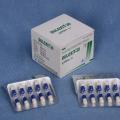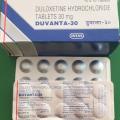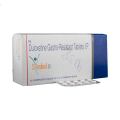Home / Categories / DXT-30MG

DXT-30MG
(5X4X10)
DULOXETINE-30MG
SEROTONIN NOR-EPINEPHRIN REUPTAKE INHIBITOR(SNRI)
RELIANCE FORMULATION
Product Details
DULOXETINE
Duloxetine (brand names Cymbalta, Yentreve, and in parts of Europe, Xeristar or Ariclaim) is a drug which primarily targets major depressive disorder (MDD), generalized anxiety disorder (GAD), pain related to diabetic peripheral neuropathy and in some countries stress urinary incontinence (SUI). It is manufactured and marketed by Eli Lilly and Company.
Duloxetine has not yet been FDA approved for stress urinary incontinence or for fibromyalgia.
Duloxetine is a selective SNRI (selective serotonin-norepinephrine reuptake inhibitor). Duloxetine is a systemic drug therapy which affects the body as a whole. Known also under the code name LY248686, it is a potent dual reuptake inhibitor of serotonin (5-hydroxytryptamine, 5-HT) and norepinephrine (NE), possessing comparable affinities in binding to NE- and 5-HT transporter sites. It is a less potent inhibitor of dopamine reuptake.
Indication
For the acute and maintenance treatment of major depressive disorder (MDD), as well as acute management of generalized anxiety disorder. Also used for the management of neuropathic pain associated with diabetic peripheral neuropathy, and fibromyalgia. Has been used in the management of moderate to severe stress urinary incontinence (SUI) in women.
Associated Conditions
- Chronic Musculoskeletal Pain
- Diabetic Peripheral Neuropathy (DPN)
- Fibromyalgia
- Generalized Anxiety Disorder (GAD)
- Major Depressive Disorder (MDD)
- Stress Urinary Incontinence (SUI)
Pharmacodynamics
Duloxetine is in a class of medications called selective serotonin and norepinephrine reuptake inhibitors (SSNRIs) and primarily targets major depressive disorders (MDD) and stress urinary incontinence (SUI). Duloxetine is also used to treat pain and tingling caused by diabetic neuropathy (damage to nerves that can develop in people who have diabetes). Known also as LY248686, it is a potent dual inhibitor of serotonin (5-hydroxytryptamine, 5-HT) and norepinephrine (NE) reuptake, possessing comparable affinities in binding to NE and 5-HT transport sites. Interestingly, its behavior contrasts to most other dual-reuptake inhibitors. Furthermore, duloxentine lacks affinity for monoamine receptors within the central nervous system.
Mechanism of action
Duloxetine is a potent inhibitor of neuronal serotonin and norepinephrine reuptake and a less potent inhibitor of dopamine reuptake. Duloxetine has no significant affinity for dopaminergic, adrenergic, cholinergic, histaminergic, opioid, glutamate, and GABA receptors. The antidepressant and pain inhibitory actions of duloxetine are believed to be related to its potentiation of serotonergic and noradrenergic activity in the CNS. The mechanism of action of duloxetine in SUI has not been determined, but is thought to be associated with the potentiation of serotonin and norepinephrine activity in the spinal cord, which increases urethral closure forces and thereby reduces involuntary urine loss.
TargetActionsOrganismASodium-dependent serotonin transporter
inhibitor
HumanASodium-dependent noradrenaline transporter
inhibitor
HumanUSodium-dependent dopamine transporter
inhibitor
Human
Absorption
Orally administered duloxetine hydrochloride is well absorbed.
Volume of distribution
- 1640 L
Protein binding
Protein binding is greater than 90%.
Metabolism
The major biotransformation pathways for duloxetine involve oxidation of the naphthyl ring followed by conjugation and further oxidation. Both CYP2D6 and CYP1A2 catalyze the oxidation of the naphthyl ring in vitro. Metabolites found in plasma include 4-hydroxy duloxetine glucuronide and 5-hydroxy, 6-methoxy duloxetine sulfate. The major circulating metabolites have not been shown to contribute significantly to the pharmacologic activity of duloxetine.
- Duloxetine
4-hydroxy duloxetine glucuronide - Duloxetine
5-hydroxy, 6-methoxy duloxetine sulfate
Route of elimination
Many additional metabolites have been identified in urine, some representing only minor pathways of elimination. Most (about 70%) of the duloxetine dose appears in the urine as metabolites of duloxetine; about 20% is excreted in the feces.
Half life
12 hours (range 8-17 hours)
Clearance
Not Available
Toxicity
Oral, rat LD50: 491 mg/kg for males and 279 mg/kg for females. Symptoms of overdose include tremors, convulsions, reduced activity, slow pupillary response, intermittent tremors, and rigidity.
Affected organisms
- Humans and other mammals
SOURCE: DRUGBANK
Substitutes




